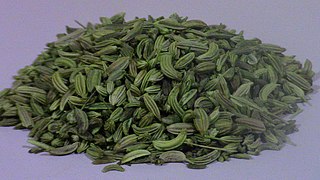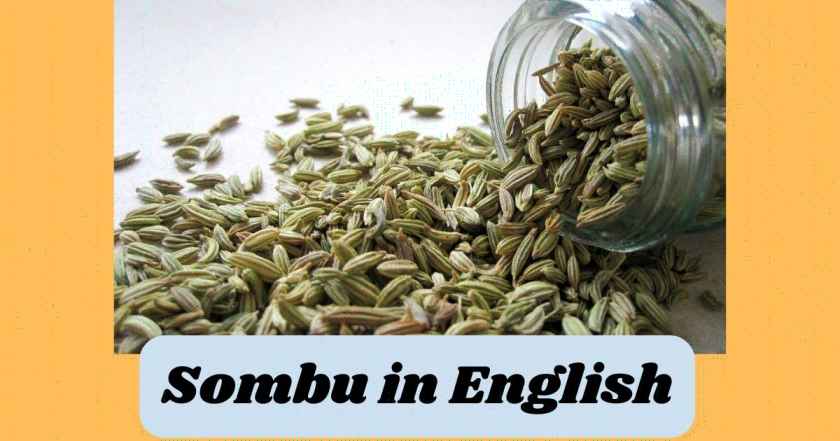Sombu in English
- Sombu English name is “Fennel Seeds”
Sombu in Hindi
- Hindi name of Sombu is “Saunf”
Sombu in Telugu
- Telugu name of Sombu is “Sopu / Pedda jilakara”
Sombu in Malayalam
- Malayalam name of Sombu is “Perumjeerakam”
Sombu in Kannada
- Kannada name of Sombu is “Sōmpu kāḷugaḷu / Badisoppu”
Sombu in Marathi
- Marathi name of Sombu is “Badishep”

What is Sombu?
Sombu, also known as fennel seeds in English, is a versatile herb that holds a special place in culinary and medicinal practices worldwide. Sombu is a Tamil name. Its scientific name, Foeniculum vulgare, reflects its botanical identity and highlights its rich history of traditional use.
Originating from the Mediterranean region, Sombu has been cherished for centuries for its aromatic flavor and numerous health benefits. In culinary applications, it is commonly used to add a distinct taste to dishes, ranging from savory to sweet. Its unique licorice-like taste makes it a popular ingredient in various cuisines, adding depth and complexity to recipes.
Beyond its culinary uses, Sombu boasts a wide array of medicinal properties that have been valued in traditional medicine. From aiding digestion to promoting respiratory health, Sombu is a powerhouse of natural remedies. Its seeds are often brewed into teas or used as a spice in cooking to harness its therapeutic effects.
When it comes to physical characteristics, Sombu is a feathery herb with bright green leaves and yellow flowers that bloom in clusters. Its cultivation is relatively straightforward, requiring well-drained soil and ample sunlight. Sombu is a hardy plant that thrives in various climates, making it accessible to home gardeners and commercial growers alike.
Sombu, known as Saunf in Hindi, is called “Sopu” or “Pedda jilakara” in Telugu, and “Perumjeerakam” in Malayalam. In Kannada, it goes by “Sōmpu kāḷugaḷu” or “Badisoppu,” while in Marathi, it is termed “Badishep.”
Whether you sprinkle it on salads, brew it into a soothing tea, or use it as a seasoning in your favorite dishes, Sombu offers a delightful blend of flavor and wellness benefits. Its versatility in both culinary and medicinal realms makes it a must-have herb in any kitchen or herbal remedy cabinet.
Sombu’s English Name
Sombu, a familiar name in Tamil households, holds a fascinating English counterpart – fennel seeds. The transition from “Sombu” to “fennel seeds” unveils a linguistic journey that mirrors the herb’s diverse cultural significance. The English name not only simplifies pronunciation for non-Tamil speakers but also sheds light on the herb’s global recognition and culinary importance.
The term “fennel seeds” stems from the Latin word “foeniculum,” meaning “little hay,” a nod to the herb’s sweet aroma reminiscent of fresh hay. This name choice reflects the plant’s feathery appearance and aromatic nature, capturing its essence in just two words. Additionally, the term “seeds” emphasizes the culinary and medicinal value found in Sombu’s tiny, potent seeds.
Understanding the English name of Sombu provides insight into its characteristics and usage. By delving into the origins and significance of the name, we gain a deeper appreciation for the herb’s versatility and widespread appeal.
Sombu Health Benefits
Sombu, also known as fennel seeds, not only adds a burst of flavor to dishes but also brings a plethora of health benefits to the table. Let’s delve into the “Sombu Health Benefits” and uncover why this tiny seed packs a powerful punch in terms of nutrition and wellness.
- Digestive Aid: Sombu is renowned for its digestive properties, helping to alleviate bloating, gas, and indigestion. Its carminative effects can soothe the digestive tract and promote overall gut health.
- Anti-inflammatory Effects: Rich in antioxidants, Sombu exhibits anti-inflammatory properties that can reduce inflammation in the body, potentially easing conditions like arthritis and inflammatory bowel diseases.
- Immune Booster: The antimicrobial properties of Sombu not only aid in maintaining a healthy gut but also strengthen the immune system, making it a natural shield against infections and illnesses.
- Respiratory Health: Sombu’s expectorant properties can help clear congestion and ease respiratory issues like coughs and bronchitis, providing relief for respiratory discomfort.
- Weight Management: Incorporating Sombu into your diet may aid in weight management due to its ability to suppress appetite and boost metabolism, supporting healthy weight loss.
- Heart Health: Sombu is a heart-friendly herb that can help regulate blood pressure and cholesterol levels, promoting cardiovascular health and reducing the risk of heart diseases.
- Menstrual Relief: For women, Sombu can be a natural remedy for menstrual cramps and discomfort, thanks to its antispasmodic properties that help relax the muscles and alleviate pain.
- Anti-aging Benefits: The antioxidants present in Sombu can combat free radicals, which are known to accelerate aging. Including Sombu in your diet may help maintain youthful skin and overall vitality.
- Eye Health: Sombu contains nutrients like vitamin A and antioxidants that support eye health, protecting against age-related macular degeneration and maintaining good vision.
- Stress Relief: Sombu’s calming properties can help reduce stress and anxiety, promoting relaxation and mental well-being in our fast-paced lives.
Medicinal Properties of Sombu
Delve into the world of Sombu, and you’ll uncover a treasure trove of medicinal properties that have been cherished for centuries. In traditional herbal medicine and Ayurveda, Sombu has been revered for its therapeutic benefits, ranging from aiding digestion to promoting overall well-being.
Modern research has further validated the ancient wisdom surrounding Sombu, shedding light on its potent medicinal effects. Scientific findings have highlighted Sombu’s anti-inflammatory properties, making it a valuable ally in combating various health issues. Its antimicrobial properties not only support digestive health but also contribute to boosting immunity, offering a natural shield against common ailments.
Moreover, Sombu’s antioxidant-rich nature plays a crucial role in reducing oxidative stress and inflammation in the body, potentially preventing chronic diseases. Whether you’re seeking relief from indigestion or looking to enhance your immune system, Sombu stands out as a versatile remedy with a holistic approach to wellness.
Culinary Uses and Recipes of Sombu
When it comes to the culinary world, Sombu shines as a versatile ingredient that adds a unique flavor profile to various cuisines. Whether you’re a seasoned chef or a home cook looking to spice up your dishes, Sombu offers a range of possibilities to explore in the kitchen.
In Indian cuisine, Sombu, also known as fennel seeds, is a staple spice that imparts a subtle licorice-like taste to dishes. It is commonly used in curries, pickles, and spice blends, enhancing the overall aroma and flavor of the food. One popular dish featuring Sombu is “Saunfia Paneer,” a flavorful paneer dish infused with the aromatic essence of fennel seeds.
In Mediterranean cuisine, Sombu plays a key role in dishes like “Greek Lemon Chicken Soup,” where it adds a refreshing and aromatic note to the broth. The slight sweetness of Sombu balances the tanginess of the lemon, creating a harmonious flavor profile that delights the taste buds.
For those looking to experiment with Sombu in their cooking, here are some tips and techniques to make the most of this versatile spice. Toasting Sombu seeds before use can enhance their flavor and aroma, adding a depth of taste to your dishes. Grinding Sombu seeds into a powder can also unlock their full potential, making them easier to incorporate into marinades, sauces, and dressings.
Whether you’re exploring traditional Indian recipes or putting a modern twist on Mediterranean classics, Sombu’s culinary prowess knows no bounds. Get creative in the kitchen and let the aromatic essence of Sombu elevate your dishes to new heights of flavor and satisfaction.
Growing and Harvesting Sombu
Cultivating Sombu, also known as fennel seeds, is a rewarding experience that can enhance your culinary adventures. To grow Sombu successfully, it’s essential to understand its cultivation methods and ideal growing conditions. Sombu thrives in well-drained soil with plenty of sunlight, making it a perfect addition to your home garden or kitchen herb collection.
When it comes to harvesting Sombu, timing is crucial. Wait until the seeds turn light brown and start to crack before harvesting them. This ensures optimal flavor and aroma in your dishes. Processing the harvested seeds involves drying them thoroughly to preserve their quality and potency.
In today’s world, sustainability is a key consideration in agriculture. When growing Sombu, opt for organic cultivation methods to minimize environmental impact and promote biodiversity. By choosing sustainable practices, you not only enjoy the benefits of fresh, home-grown Sombu but also contribute to a healthier planet for future generations.
Embrace the journey of growing and harvesting Sombu to connect with nature, savor the fruits of your labor, and infuse your dishes with the authentic flavors of this versatile spice. Let your culinary creations bloom with the essence of freshly harvested Sombu, adding a touch of freshness and vibrancy to every meal.







